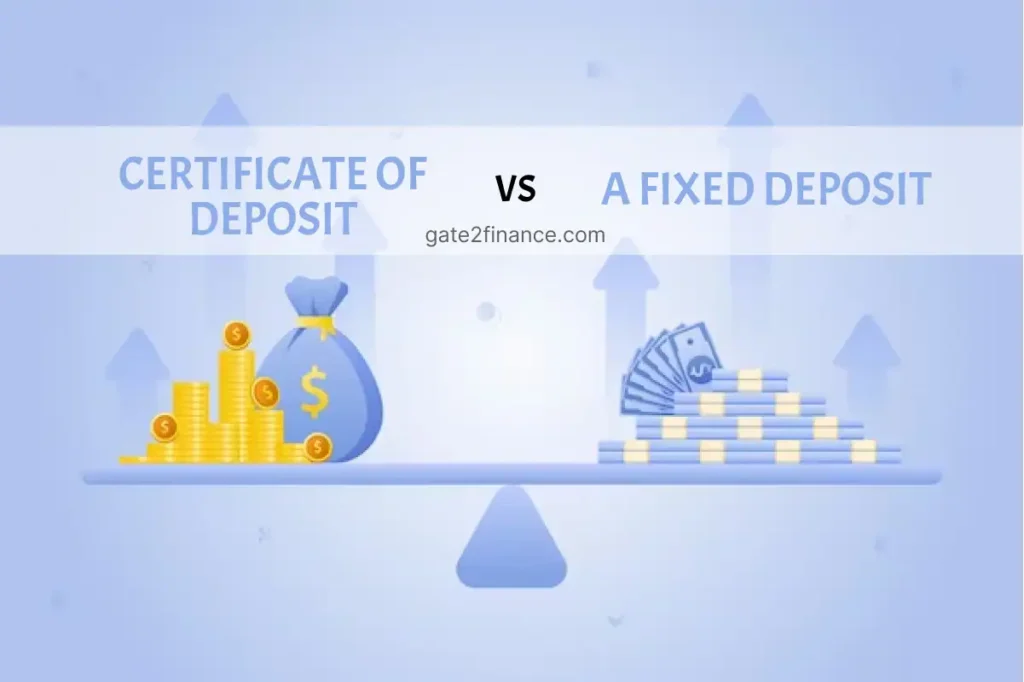What Is a Certificate of Deposit (CD)?
In the United States, a certificate of deposit (CD) is a time deposit sold by banks, thrift organisations, and credit unions. CDs differ from savings accounts in that they have a particular, limited term before cash can be transferred without penalty and typically have greater interest rates. The bank anticipates that the CDs will be held until maturity, at which point they will be withdrawn and the interest paid. CDs are insured in the United States by the FDIC (Federal Deposit Insurance Corporation) for banks and the National Credit Union Administration (NCUA) for credit unions.
Institutions often give greater interest rates in exchange for the consumer depositing money for an established duration than they do on banks that customers can take from on demand, although this may not be applicable in an inverted yield curve situation. Fixed rates are normal, however some institutions provide CDs with variable rates in various forms. Interest rates were predicted to climb in mid-2004, therefore several credit unions and banks begin offering CDs that included a “bump-up” provision. These allow for a single interest rate modification at a point of the the customer’s choosing during the certificate of deposit duration. CDs indexed to the stock market, debt market, or other indexes are occasionally introduced by financial organisations.
Features of Certificate of Deposit
Here are some key characteristics of CDs, as well as how they contrast to other financial vehicles.
- A greater amount of interest should or may be paid on a larger principal.
- Except in the case of a yield curve that is inverted (e.g., preceding a recession), a longer period normally earns an interest rate that is greater.
- Personal CD accounts typically earn higher rates of interest than commercial certificate of deposit accounts.
- According to the Income Tax Act, it is fully taxable.
- Credit unions and banks that do not have FDIC or NCUA insurance usually offer higher interest rates.
- CDs issued by SCBs have a term span of three months to 1 year, whereas certificate of deposit issued by institutions of finance have a term length ranging from a year to 3 years.
- Selected financial institutions (SCBs) and All-India banking institutions issue certificates of deposit. Cooperative banks and Regional Rural Banks (RRBs) are not permitted to issue certificate of deposit.
- Smaller organisations typically provide greater rates of interest than larger institutions.
- CDs in dematerialised form, like dematerialised securities, can be transferred via endorsement or delivery.
- In India, certificates of deposit can be granted for a minimum investment of one lakh rupees or in multiples of that amount.
- A document that serves as proof of deposit has no lock-in term.
Terms and conditions for Certificate of Deposits
The federally mandated “Truth in Savings” pamphlet, or another disclosure document outlining the CD’s provisions, must be made available prior to purchase. Employees of the organisation are generally unaware of this knowledge, and only a written record carries legal weight. If the primary issuing institutions has merged with a different institution, or if the purchaser closes the CD early, or if there is another issue, the purchaser must refer to the conditions of the purchase document to ensure that his or her withdrawal is processed in accordance with the original contract terms.
- The conditions of use are subject to change. They may include text like “We as a can add to, remove from, or make any additional modifications (“Changes”) we desire to these Conditions at any time.”
- The CD could be called. The provisions of the CD may stipulate that the financial institution or credit union may close it before the term expires.
- Interest is paid. Interest can be payed out as it accumulates or left in the CD.
- Interest is calculated. The CD may begin earning interest on the initial day of deposit or at the beginning of the following month or quarter.
- The right to postpone withdrawals. To prevent a bank run, institutions typically have the authority to postpone withdrawals for a set period of time.
- Withdrawal of principal. It is possible that the financial institution will decide. Withdrawal on principal below a particular minimum or any transfer of principle at all may necessitate termination of the entire CD. A US Individual Retired Account certificate of deposit may allow departure of IRA Required Maximum Distributions without a departure penalty.
- Interest withdrawal. It may be restricted to the current installment of interest or allow withdrawal of the total interest accumulated since the CD first opened. Interest can be calculated from the date of withdrawals or from the end of the previous month or quarter.
- Early withdrawal incurs a penalty. It could be quantified in months of interest, computed as the institution’s current price of replenishing the money, or another calculation. The principal may or may not be reduced for example, if the principal withdraws within three months after establishing a certificate of deposit to avoid a six-month punishment.
- Fees. A fee for withdrawal or closure, or for providing a certified check, may be specified.
- Renewal on its own. The financial company might or might not choose to provide a notice prior to automated rollover at CD expiration. Before immediately changing across the CD to a fresh CD upon maturity, the institution may designate a grace period. Certain financial institutions have been documented to renew CDs at lower rates than the original.
Advantages & Disadvantages of Certificate of Deposits
Advantages :
- The terms and quantities that can be invested into a certificate of deposit are both adaptable. If you do not want to lock up the cash for an extended period of time, you may easily select for a shorter period of time.When a CD term expires, you can renew it or begin a new one.
- CDs purchased from a federally insured institution are typically protected up to $250,000. This removes a significant portion of the risk from the investment.
- Because CD holders are not permitted to withdraw funds as freely as deposit account participants, a CD is frequently more important to the banking institution. As a result, the interest rate paid to CD holders is higher than that of a regular savings account.
- Different financial organisations provide CDs with varying maturities and durations. Investors can select a certificate of deposit that matches their specific demands due to the variety of CDs available.
- The shareholder can be confident of receiving a particular yield at a particular moment in time. Even if interest rates in the broader economy fall, the certificate of deposit price will remain unchanged. You will be able to simply calculate the rate that your balance will grow, making financial planning simple.
Disadvantages :
- The invested sum has been parked for the desired term, and withdrawal is only possible with a penalty. As a result, it has limited liquidity.
- Banks renew CD interest rates if the owner cannot decide whatever to do with the aged amount, and the new rate of interest may be lower than that of other investment possibilities.
- Because CD interest rates are not linked to the level of inflation, the purchasing power of money may fall as inflation rises.
Which is better: a Certificate of Deposit or a Fixed Deposit ?

A Certificate of Deposit is a deal with a bank to deposit a specific sum for a specified length of time. The financial institution will pay interests on the deposited sum on this. The deposit amount is likewise limited or frozen for the term specified. This is an investment that is open to negotiation.
A Fixed Deposit (FD), on the other hand, is a sort of investment option offered by banks and other financial institutions that are not banks. When compared to a standard savings account, the device offers a greater percentage of return to the investor. This cannot be freely negotiated.
The choice between a Certificate of Deposit and a Fixed Deposit is determined by the investor’s financial goals. assessing the risk and anticipated returns, one should contact with their financial consultant to determine which strategy will best complement their investment. While Certificates of Deposit provide high interest rates and are investments with little risk, there are several factors to consider before investing, including the fact that Certificates of Deposit are not totally liquid, as well as the hazards of early withdrawal penalties and inflation. In a similar vein fixed deposits are a safe investment, but they are susceptible to inflation risks, the interest on FDs may not be tax-free, and not all FDs may be easily liquidated.









